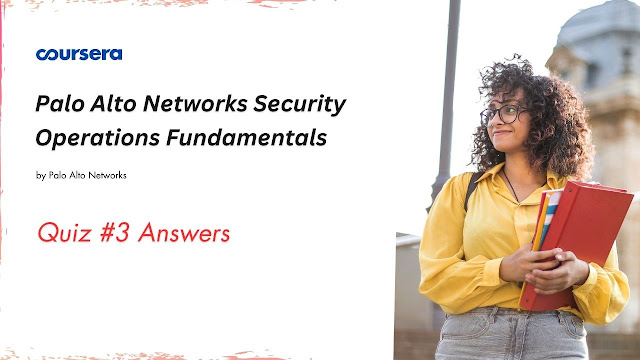In this article i am gone to share Coursera Course: Palo Alto Networks Security Operations Fundamentals Quiz #3 Answers with you..
Enroll Link: Palo Alto Networks Security Operations Fundamentals
Palo Alto Networks Security Operations Fundamentals Quiz #3 Answers
Question 1)
Which SOC feature helps ensure consistency through machine-driven responses to security issues?
- Automation
- EDR
- Threat Intelligence
- DLP
Question 2)
Which SOC team is responsible for the implementation and ongoing maintenance of the SecOps team’s tools, including the SIEM and analysis tools?
- Engineering
- Security
- Operations
- Development
Question 3)
Which SOC Infrastructure tool is used as a central repository to ingest logs from all corporate-owned systems, as well as collect and process audit trails, activity logs, security alarms, telemetry, metadata, and other historical or observational data from a variety of different applications, systems, and networks in an enterprise?
- Analysis
- SIEM
- Engineering
- Orchestration
Question 4)
Which SOC function allows for accelerated incident response through the execution of standardized and automated playbooks that work upon inputs from security technology and other data flows?
- SIEM
- EDR
- SOAR
- DLP
Question 5)
Which SOC tool allows an organization to define incident analysis and response procedures in a digital workflow format.
- DLP
- SOAR
- EDR
- SIEM
Question 6)
Security Operations infrastructure includes a security information and event management – SIEM – platform, analysis tools, and SOC engineering.
- True
- False
Question 7)
SecOps engineering tools are often based on machine learning, deep learning, and artificial intelligence— that provide either stand-alone, embedded, or add-on functionality to detect evidence of a security compromise.
- True
- False
Question 8)
SOC playbooks coordinate across technologies, security teams, and external users for centralized data visibility and action.
- True
- False






0 Comments